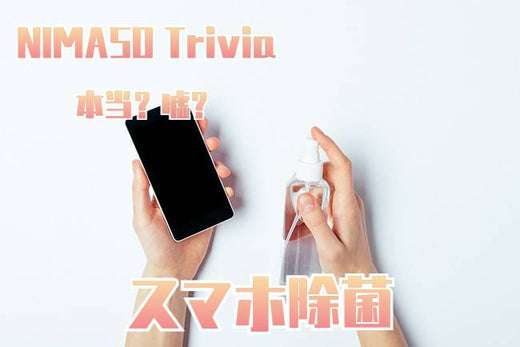When spring arrives, we're all worried about hay fever, but we're also concerned about germs. Especially in recent years, with the COVID-19 pandemic, we've become very particular about disinfection. I'm sure many of us carry alcohol-based disinfectant with us at all times. NIMASO staff also keep disinfectant wipes and sprays at the office, and wipe their hands and spray their clothes with them immediately after arriving. Furthermore, even those who are particularly sensitive about germs try to keep surfaces that people frequently touch, such as doorknobs and faucets, clean by wiping and disinfecting them, but for some reason, they don't make much effort to keep their smartphones clean.
On April 2nd, NIMASO conducted a poll on their official Twitter account about whether or not to disinfect their smartphones. The results showed that 55% of people chose "No." This means that people are not very conscious about disinfecting their smartphones, which they bring into bathrooms, gyms, subways, and buses and have become like an extension of their bodies.

The official NIMASO Twitter account is currently running the second poll on smartphone sterilization. If you're interested, please vote.
However, according to research conducted by Dr. Peter Papadakos, director of clinical care at the University of Rochester Medical Center,
"Smartphone screens are breeding grounds for bacteria and viruses, and there have been numerous reports of people contracting the virus through their smartphone screens," he said. Furthermore, as a measure against COVID-19, it's important to thoroughly disinfect your smartphone.
But have you heard that disinfectants, alcohol, etc. can damage your phone? Is that true?
Apple's website lists instructions for sterilizing iPhones by model. Let's take a look at that first.

The New York Times also reported that it is effective to dilute 70% isopropyl alcohol (or rubbing alcohol) with water in a 1:1 ratio in a spray bottle, lightly dampen the aforementioned lint-free cloth with the dilution, and then wipe your smartphone with it.
But be careful how you do it. It's fine to spray it on your phone and then wipe it down with a damp cloth, but don't spray it directly on the screen. You might also be tempted to use disinfectant wipes, but these should be avoided at all costs, as they can damage your phone's surface. Dr. Papadakos especially recommends avoiding products like Clorox wipes, as they contain chemicals that can harm your phone's screen itself.
In short, under certain conditions, disinfectant alcohol wipes and other disinfecting methods will be permitted.
For those who are not very conscious about sterilization, we recommend a comprehensive solution: installing a glass film with antibacterial properties. NIMASO applies a hybrid antibacterial coating during ion exchange, maintaining permanent antibacterial properties and effectively inhibiting bacterial growth with a 99.9% antibacterial rate (antibacterial rate for E. coli and Staphylococcus aureus according to SGS inspection reports).
In addition, NIMASO has developed a glossy, antibacterial glass film that utilizes high-transmittance technology to enhance the clarity of iPhone displays. NIMASO has also added antibacterial properties to its blue light blocking glass film , reducing eye strain while also providing antibacterial effects.

NIMASO recommends replacing your glass film one to one and a half years after application. This is because the oleophobic layer coated on the glass film gradually thins with daily use, making it harder for your fingers to slide across your screen. So, this spring, say goodbye to germs with NIMASO!









